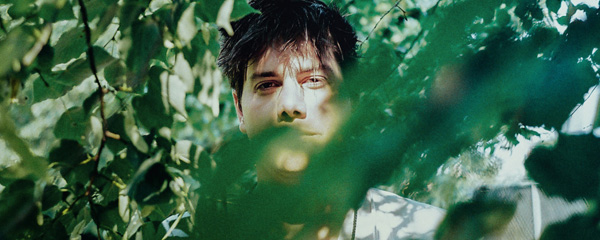
Tracks
Mas Ysa: "Look Up"
Single (2015)
By Corey Beasley | 14 April 2015
Art: Tonje Thilesen, tonjethilesenphoto.tumblr.com
I’ve been running lately. It’s tough going—waking up early on a cold grey morning to drag myself out onto the concrete, running and walking and running and walking, my lungs struggling to shake off a self-pitying winter’s worth of marijuana ash, my heart thumping against the little cage I’ve made for it out of hardened latenight takeout grease, the indignity of having to do it all outside in these idiot sweatpants. It can be hard, sometimes, to see the point after coming home to shower before work, my body in the mirror the same infirm, imperfect thing I saw in the mirror the morning before. It’s a slow process, I get it, but if you can’t see the progress, what good is it to tell yourself it exists?
“Show me work, show me work, show me work,” Thomas Arsenault pleads at the start of “Look Up,” the first single from his Mas Ysa’s upcoming debut record. “With the grace that you’re given / I want to know what you’ve done?” he asks, not an accusation so much as a question meant sincerely, a question asked—and you hear this in his voice, the quiver undisguised in a jawdropping performance straddling the line between masterful control and unvarnished abandon—from a place of love. In the song’s first moments, a wash of acoustic guitar and a far-off, undersea rumble of bass and percussion gives way to a steady, four-on-the-floor beat, and out of that steadiness comes a single chiming synth note, repeating on every third beat in the measure—something like a beacon, or the calming blip of a heart monitor when the body it watches over rests in full health. Something that guides. Something of grace.
It’s a hard thing to find when you’re looking for it, grace. Some people, I understand, don’t believe in the notion at all. “Always look / and always look / and always look / up,” implores Arsenault after an assault by an array of thundering percussive bursts, booming in nearly untraceable patterns. They give way, ceding the mix’s spotlight to a warm acoustic guitar riff tinged with flamenco, a breath of relief in the gale of the song’s relentless, restless kinetics. The guitar’s soothing melody uncoils at a rhythm of its own logic, tethered to the beat but free to wind around it, beside it, its hyperactivity similar to that of the earlier percussive bridge but here transforming that energy into uplift, renewal.
“Look Up” sounds like running until something loosens in your chest, the feeling of pushing your stupid body toward its breaking point, the realization that the breaking point is past—way past—what you’d imagined it to be before you set yourself to moving. The serenity that comes with that effort, the physicality of it, which you feel for a few seconds before it floats off again. The way it leaves a mark even so, which helps you make it to the next time you feel it, and then the next time, and on and on. Grace takes work, it suggests. It won’t come to you in bed, or on the couch, or by looking down at your own feet. You have to shake it loose, break yourself in order to see it, and see how the process itself is the point, not what you see in the mirror after you throw yourself for miles down city sidewalks, with their endless parade of human misery, at 5AM. It’s the throwing that counts. Show your work, show your work, show your work.





